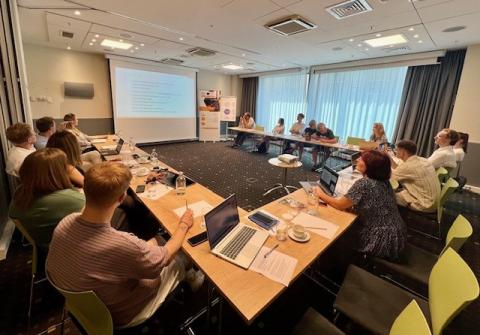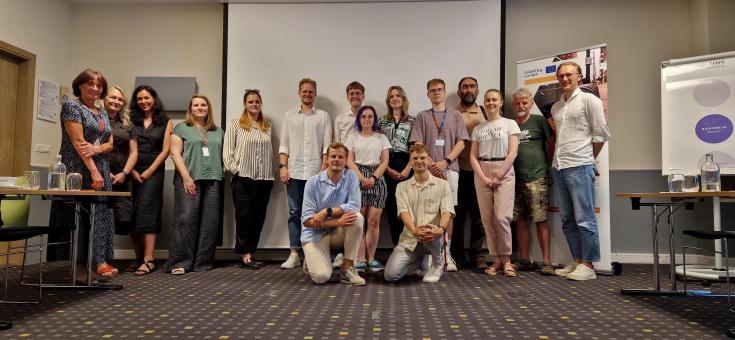Third Stakeholder Regional Meeting in Vilnius
The third meeting of stakeholders organized by the EMBRACER partner the Municipal Enterprise "Susisiekimo paslaugos" (JUDU), took place on July 17 in Vilnius. The meeting was attended by 12 representatives of interested parties and 10 representatives of the partner organization. The purpose of the meeting was to discuss the project's progress, challenges, and the preparation process for testing an autonomous shuttle. Participants were introduced to the Interreg Europe and Horizon projects conducted by the partner together with the municipality, which are closely aligned with the goals of EMBRACER.
Participants discussed the need for information sharing not only among project partners but also with national and municipal-level institutions in their respective countries. Discussions covered strategic documents being prepared in Lithuania, the importance of a comprehensive synergy of data collection for climate change projects, and aspects of autonomous public transportation.
The Ministry of Transport and Communications shared information about the upcoming sustainable mobility conference to be held in Kaunas in the fall. The event will be intended primarily for municipalities, urban planners, and DJMP developers and implementers. The focus - on the Lithuanian audience. Three topics are planned:
- Unified ticket (e-ticket) – the best practices of Lithuanian Railways in cooperation with several cities;
- Low emission zones (Kaunas plans to open an LEZ in September, and Vilnius on January 1, 2025);
- ITS (intelligent transport systems) topic. New directive, new plans.
Vilnius will be invited to present EMBRACER project and other city projects and initiatives.
Lithuanian municipalities feel a lack of sharing relevant information from all municipalities and best practices from related EU-funded projects. Smaller cities are interested in hearing about the innovations from larger cities like Vilnius, Kaunas, and Klaipėda.
The Ministry, in collaboration with the State Data Agency, has created a sustainable mobility data platform that will soon host data from municipal enterprises, "REGITRA," and other relevant sources and topics (e.g., public transport, electric vehicles, micro-mobility). A data entry tool for municipalities will be developed and is currently being tested in Vilnius.
Finally, the Ministry underline the importance for Vilnius to have a walking policy and JUDU is invited to collaborate on that.

Vilnius City Municipality. The GreenMe5 project used data from some pilot streets. Many data related to air pollution were analyzed. The municipality's "Green City Accord" commitments are also data-related. The municipality is carrying out many projects where data interconnects. The synergy of projects is commendable as it ensures greater dissemination. The city of Vilnius is participating in the climate neutrality mission (aiming to become a completely climate-neutral city by 2030). Under the "neutrality" umbrella, much is covered. Transport is one of the main objects of achieving climate neutrality because it emits the most pollutants.Lithuania should be more active in participating in this program's projects despite the strong competition. However, universities always need partner cities that are used as a testing platform.
The representative from the Užupis community shared information about the planned autonomous bus test that should be integrated into the general transport scheme. The community is making suggestions for more favourable PT routes. Since there are educational institutions in the area, parents need to be accustomed to teaching children to use public transport. Užupis has many young families, all with cars. Parking problems will become more acute in the future. Autonomous transport in Užupis would only be a temporary solution. The fact that the autonomous service is planned for the outskirts (an insufficiently serviced area) indicates that the city lacks comprehensive solutions. The key demand points for public transport in Užupis - such as schools, shopping centres, and workplaces - are located outside of Užupis, and the distance to public transport is significant.
The representative from the Lithuanian Association for the Blind and Visually Impaired, speaking on behalf of his community, stated that people with vision problems usually do not oppose innovations. It is important that any project or initiative undertaken is fully completed. The public transport application "Transporto balsas" is lacking in completeness. The representative is confident that autonomous transport will be very popular and convenient in the future for short, small, and simple routes and in areas where PT stops are far from homes, and people do not have many other means of reaching them or can only do so by car. It is emphasized that successful "autonomous" public transport requires a quality/uninterrupted internet connection.

